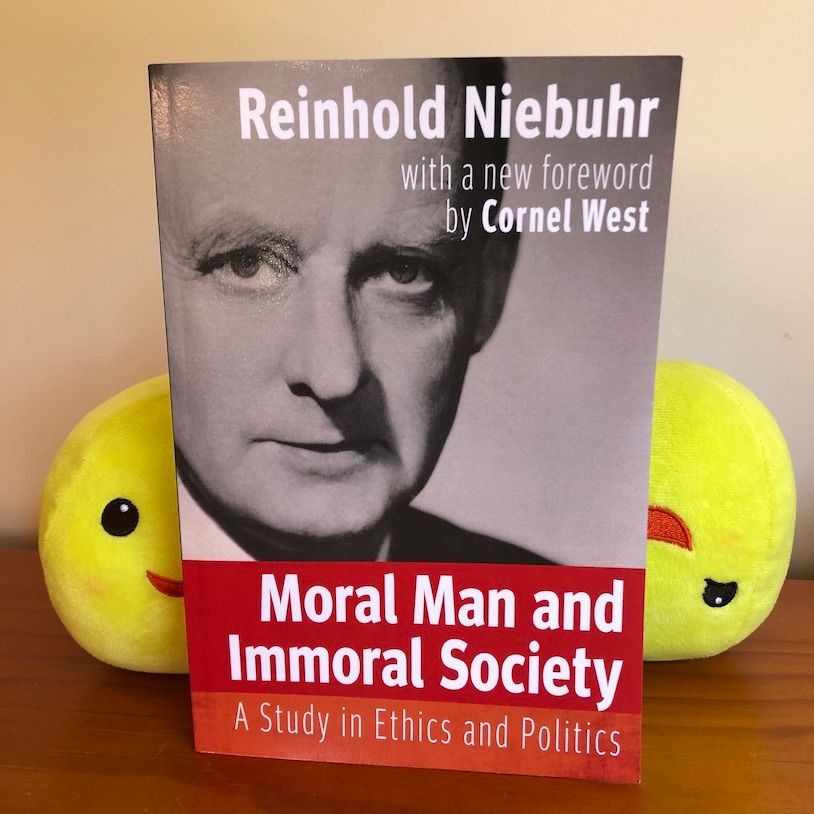道德的人,不道德的社會——讀尼布爾
Reinhold Niebuhr,尼布爾,是一個我只多年前在Public Theology裡聽過的名字[註]。大概四年前,我忘了在哪又看到人提這本書,那時剛讀完一本講一次和二次世界戰爭間這段期間歷史的書,於是對這本同樣出現在兩次戰爭中間的書非常感興趣,而這本書光是書名就好吸引人:
道德的人,不道德的社會。Moral Man and Immoral Society
(副標題是:A Study in Ethics and Politics)
當時買了,一讀就驚為天人,整個傾服,我還記得是好到我甚至無法在日記\筆記裡寫的那種好,我不太會解釋,有時候讀書,讀到一段擊節激賞的文字,還可以抄下來,做筆記,寫寫感想,但當一本書整段整頁都讓人冒驚嘆號時,反而無法說或不知道怎麼說(超載),就如同整頁都劃線,最後就跟沒劃線一樣。
在讀尼布爾時,就是這種情況,我覺得這本書如此精闢,很多段落都彷彿直接對著當下的局勢說話,而且說的比我讀到的時下各種評論更精準、犀利、深刻,儘管這是一本八九十年以前的書(然後這種時候我就會很想按按鈕)。
也許因為對政治學一無所知,這書我讀得很緩慢,一個小時只能讀十頁大概,過了幾個月才讀了一半,然後我好像就又對書中關切的世界失去興趣(我對公共領域事物的興趣無法維持很久),然後就闔上了這本書,然後四年來一次都沒有打開過。
上個禮拜,也許是因為剛讀完一本很厚的十九世紀小說,想要插一本non-fiction先,然後想到也許該努力關一下我家十數本以上被我開了從幾十頁到一兩百頁不等的書(雖然不管怎麼努力,關書的速度應該還是趕不上比開書的速度,如同買書速度永遠比讀書速度快這個黃金律),就想到這本書,拿起來,覺得我如果從當初中斷的地方看下去,就算看完,也只是勉強滿足自己「我終於讀完這本書」的心理,如果真的想記得什麼的話,勢必得重看...。
四年後重讀,我還是覺得精準,然後我還是一直想劃線,然後又覺得,既然尼布爾寫的是關於人們如何處理社會、社群治理的難題,這些內容,不正好適合拿出來在公領域討論嗎?
這是一個對政治學一無所知的人,讀一本政治學與倫理道德的書的書摘\筆記。我老是在讀死人書時覺得他在對今天的我說話,我也想確認,是不是只有我鬼上身:一本九十年前的書,是不是仍然能夠對2021年的我們說話?
1919年,英國經濟學家凱恩斯出版了《The Economic Consequences of Peace和平的經濟代價》,預言了一戰後凡爾賽條約對戰敗國的嚴苛條款與鉅額賠償金會讓德國在無力償還下,邁向極速通膨的經濟危機,而在經濟危機下,極端軍國主義便會有相當可能抬頭(雖然當代保守派歷史學家Niall Ferguson不這麼認為)。
那時還沒有聯合國,只有沒有任何實質力量,也無力約束德國的League of Nations國際聯盟。
那時美國跟歐洲都還籠罩在1929年開始的大蕭條的影子裡。
那是1932年,離希特勒成為德國總理不到一年。
〈第一章:人與社會〉
政治學聽起來很高眉,是屬於鎖在大學教授辦公室、厚得跟磚頭一樣的書、政客們閉門深鎖的內的神秘世界。但我想對尼布爾來說,政治學的定義很簡單,就是人如何解決共同生活的難題,所以第一章的標題為:
Man and Society:The Art of Living Together
人與社會:共同生活的藝術
科技、技術的進步,加劇了社會的不平等
That same technology, which drew the fangs of nature's enmity of man, also created a society in which the intensity and extent of social cohesion has been greatly increased, and in which power is so unevenly distributed, that justice has become a more difficult achievement.
這話乍看之下弔詭,因為我們一般以為,科技進步讓所有人變得更平等:如果你和Elon Musk用的都是iPhone,一天都花三四個小時在推特跟其他社群平台上,那你們的生活水平其實沒差那麼多(選馬斯克當例子,因為他是新出爐的首富)。
科技提升的也許是整體物質生活的水平,但科技\技術的進步,亦加深了權力分佈的不均,我們一般覺得在封建社會裡,君主、皇帝擁有至高無上的權力,但科技的侷限,其實大大限制了執行政府權力的官僚系統的效能(光想古今通訊技術的差距就夠了),所以所謂的絕對王權,絕對的領域以及觸及率並不那麼大,所以才會有「天高皇帝遠」這話嘛。
相比之下,廿四小時監視監聽我們的政府跟企業(感謝科技),可能比古時的君主更掌握我們——至少Google知道所有我們在子夜二時丟給它的所有屬於夜深人靜時的問題、慾望跟癖好。
群體生活就是一種強迫與控制(coercion)
All social co-operation on a large scale than the most intimate group requires a measure of coercion.
而政治,直到歷史終結時,都會是良知與權力交會之處,咬合、鬥爭、協商,乃至達成妥協的領域:
Politics will, to the end of history, be an area where conscience and power meet, where the ethical and coercive factors of human life will interpenetrate and work out their tentative and uneasy compromise.
民主:給理想主義者的清醒針
民主亦是此折衷、妥協下的選擇,並非萬靈丹,並不佔有道德上的制高點:
The democratic method of resolve social conflict, which some romanticists hail as a triumph of the ethical over the coercive factor, is really much more coercive than at first seems apparent. The majority has its way, not because the minority believes that the majority is right (few minorities are willing to grant the majority the moral prestige of such a concession), but because the votes of the majority are a symbol of its social strength. Whenever a minority believes that it has some strategic advantage which outweighs the power of numbers, and whenever it is sufficiently intent upon its ends, or desperate enough about its position in society, it refuse to accept the dictates of the majority.
民主其實是多數強迫少數服從的多數決議、majoritarianism,即所謂的rule by majority,所以任何贏得選舉的政客都需要對在勝選演講中使用「人民說話了」這類語彙有所警覺,要記得有幾百萬或幾千萬張選票一點都不買你的帳,選贏,不代表取得道德或正義的話語權。(這當然是選舉日開票激情夜後,抽事後菸時的反省話,當我看到我支持的候選人、政黨選贏當下的激情,類同看到支持的足球隊贏球的興奮。)
要是沒有意識到這點,被壓抑的少數遲早會反撲,他們服從,是因為暫時被打趴,給他們貼上民粹主義者、暴民之類的矮化標籤,並不是明事(不是說民粹主義不需要清醒、理性的研究,但是純粹給自己不認同的人貼上刻板印象的標籤,對民主並沒有幫助)。
政治不是道德或正義優越性的競技場
幾乎沒有人是不考量自身的經濟利益、好處去投票的(稍後再講到從身份政治的認同上去投票):
If political issues were really abstract questions of social policy upon which unbiased citizens were asked to commit themselves, the business of voting and the debate which precedes the election might actually be regarded as an educational programme in which a social group discovers its common mind. But the fact is that political opinions are inevitably rooted in economic interest of some kind or other, and only comparatively few citizens can view a problem of social policy without regard to their interest.
Conflicting interests therefore can never be completely resolved; and minorities will yield only because the majority has come into control of the police power of the state and may [...] augment that power by its own military strength.
Should the minority regard its own strength, whether economic and martial, as strong enough to challenge the power of the majority, it may attempt to wrest control of the state apparatus from the majority, as in the case of the fascist movement in Italy.
如上,少數尚未反撲,只是不能而已。只要逮到機會,掌握足夠權力,隨時都有可能奪權:所謂政變。
國家的意志,永遠是讓部分人噤聲後才成立
所謂國家的意志:
The coercive factor is always present in politics... only a romanticist of the purest water could maintain that a national group ever arrives at a "common mind" or becomes conscious of a "general will" without the use of either force or the threat of force.
和平,必然得透過強迫手段才取得,如果戰爭離我們的想像太遙遠,監獄本身就是這樣的所在,我們真的以為把一群罪犯關在一起可以達到感化、使其向善的效果嗎?其實就是掠奪少部分人的自由,換取剩下在外面人的和平的手段。
The limitations of the human mind and imagination, the inability of human beings to transcend their own interests sufficiently to envisage the interests of their fellowmen as clearly as they do their own makes force an inevitable part of the process of social cohesion.
為什麼暴力和強迫必然是社會和諧的代價?捫心自問,因為沒有人可以真的待人如己,沒有私心,把別人的需要看得和自己的一樣重。
The same force which guarantees peace also makes for injustice
以上所摘錄的,才進行到第六頁的畫線處而已,尼布爾真的很滿有沒有(或是因為我缺乏政治學理論基礎,所以才一路嘴巴開開...),希望下一篇可以至少寫到書名:why moral man, immoral society?
然後以我這種進度,中途(二度)棄書的可能性很高。
註:我不知道尼布爾,但廿世紀以來,尼布爾在神學一直影響公共倫理與政治思想的的美國其實挺紅的,好幾位美國總統都宣稱深受其影響。
